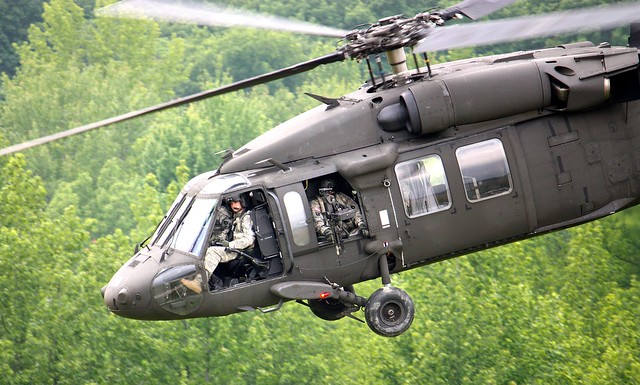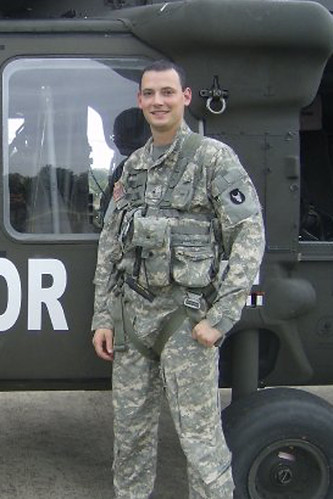Story by Spc. Brandy Mort, 133rd Mobile Public Affairs Detachment
[caption id="" align="aligncenter" width="576"]

Chief Warrant Officer Jonathon Tidei pilots a UH-60 Blackhawk in aerial gunnery operations at Jefferson proving ground, Ind., June 2013. From an early age, Tidei knew he wanted to fly. (U.S. Army National Guard photo by Sgt. Tom Harrington)
July has been declared Kentucky National Guard Warrant Officer Month in a proclamation by Gov. Steve Beshear. This is one of a series of articles we are publishing in celebration of the warrant officer corps. Click here to read more about 95th birthday of the Army's warrant officer corps.
FRANKFORT, Ky. -- In 1953 the inception of the Warrant Officer Flight Program lead to the training of thousands who later became helicopter pilots during the Vietnam War. In April 1955, the 1
st Aviation Class, at then, Camp Rucker, Alabama graduated. These first warrant officer pilots played an important role in the development of Army Aviation and were vital to its evolution.
Chief Warrant Ofiicer Jonathon Tidei, a UH-60 Blackhawk Pilot with Bravo Co. 2/147th Aviation, always knew he wanted a career in aviation. His father, Master Sgt. Anthony Tidei and his three brothers Sgt. Paul Tidei, Spc. Caleb Tidei and Pvt. Joshua Tidei, are all in an Aviation unit within the Kentucky National Guard.
[caption id="" align="alignright" width="233"]

Warrant Officer Jonathon Tidei on deployment to Kosovo, 2009. (Courtesy photo)
“I was always interested in aviation,” said Tidei, “And all I wanted to do when I joined the military was fly. I signed up as an aircrewmember in the Kentucky Air Guard and flew as a C-130 Loadmaster for four years. I wanted to go to flight school as soon as I could, and when my dad told me about the Warrant Officer program I realized that would be the fastest way for me to get into flight school. Once I understood the role Army Aviation Warrant Officers serve in, I knew it was the right fit for me.”
As a Blackhawk pilot, Tidei’s primary job is to plan and fly missions to transport passengers and cargo to the right place at the right time to support ground forces.
“Warrant officers have a high level of specialization in their given job,” said Tidei, “In an aviation unit, warrant officers provide a continuity of experience and serve in specialty tracks as maintenance test pilots, safety officers, instructor pilots and tactical operations officers.”
Tidei and his wife travel whenever they can. Tidei has also previously been deployed. He is thankful for the unique experiences that the military has given him.
“At the end of our deployment to Kosovo we had to fly our aircraft from Kosovo to Germany so the helicopters could be shipped home,” said Tidei, “Flying along the Adriatic coastline and through Austria and Germany was an awesome experience.”
Tidei’s job also lets him be involved with some of the Kentucky National Guards newest pilots.
“I've been the Bravo Company ALSE officer,” said Tidei, “ Which means I help maintain aviation life support equipment that air crews require to do their jobs. Right now I'm also a unit trainer, so I help train newer pilots in some of their mission tasks like performing sling load operations.”
Most Service members will tell you that they have the best job, and Tidei thinks that being a warrant officer is the same way.
“I know this claim is made often,” said Tidei, “But I think being a warrant officer is the best job in the Army. If you are interested in being a subject matter expert in your branch, whatever it may be, go warrant!”